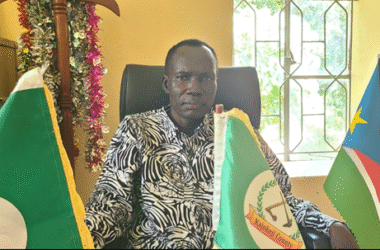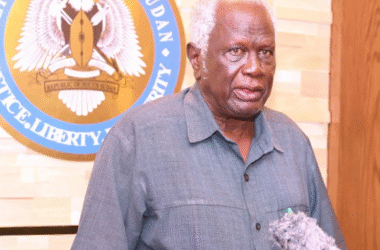By William Madouk
Since his appointment, Mr. Barech Lual Chol, Commissioner of Melut County in Upper Nile State faced hectic times, resettling returnees who fled gunfire from neighbouring Sudan.
After sorting out returnees, Mr. Chol now charted developmental blueprint priorities, for instance, the construction of over 11 km of feeder roads, including fixing urban water treatment systems.
In an exclusive interview in Melut, Mr. Chol said his four months in office have been quite busy with returnees’ influx, where travel several times to Joda and Renk for repatriation of those to the county.
“Since I came, I found some challenges, so that is why I have gone like four months, right now, without taking a step in any programme. There were also demands from teachers and doctors, which I’ve been clearing within this 4-month period,” Melut county commissioner said.
The Commissioner was also deeply engaged in charity organisations to aid and resettle returnees as most of them fled the disastrous war in Sudan, empty-handed.
Mr. Chol then outlined his developmental plans for Melut County to ease mobility and provide clean drinking water.
“In my programme, I am starting with roads, so right now, there is one company that is going to construct for us 11.5 km road within the town. So, maybe this week they will start doing it,” he said.
In his project plan, Mr. Chol promises installation of water system in the area.
“Then also, we are planning to install water systems within the county, which is also one of my programmes,” he added.
According to him, the project was meant to fulfil citizens dreams by bringing services closer to them.
“My plan is that I want to fulfil citizen needs and not my interests because when we build offices or guest houses, our citizens are not going to sleep there. That’s why I ask my citizens what they want,” Chol noted.
Melut is a County in the Upper Nile State; the region is one of wide, flat, and low-lying plains with black cotton soils, covered by Savannah grasslands and acacia trees.
In Upper Nile state, the Nile River is the main transportation route during the rainy season.
“So, now there are challenges with roads, especially during the rainy season [muddy soil], which make it difficult even for our kids to go to school,” Chol added.
He said that is why the county should embark on developmental activities to make it possible for the children to go to school easily.
“Also, water, because some of the residents are staying far from towns and rivers, and they cannot go and get water from rivers because it is not clean; that’s why we want to do a water network for clean water within the towns.” He stressed.
The Nile and its small seasonal tributaries are the main sources of drinking water, fishing grounds, and water for cattle, particularly in the dry season, according to the commissioner.
Most people rely on agro-pastoralism for a living and engage in small-scale trading.
In March of this year, President Salva Kiir appointed Barac Lual Chol Aginy as the new commissioner of Melut County after firing Deng Joh Angok.
In a similar decree, President Kiir sacked the commissioner of Fashoda County, Joseph Abang Adiang, and replaced him with Royo Yor Deng Kur.



